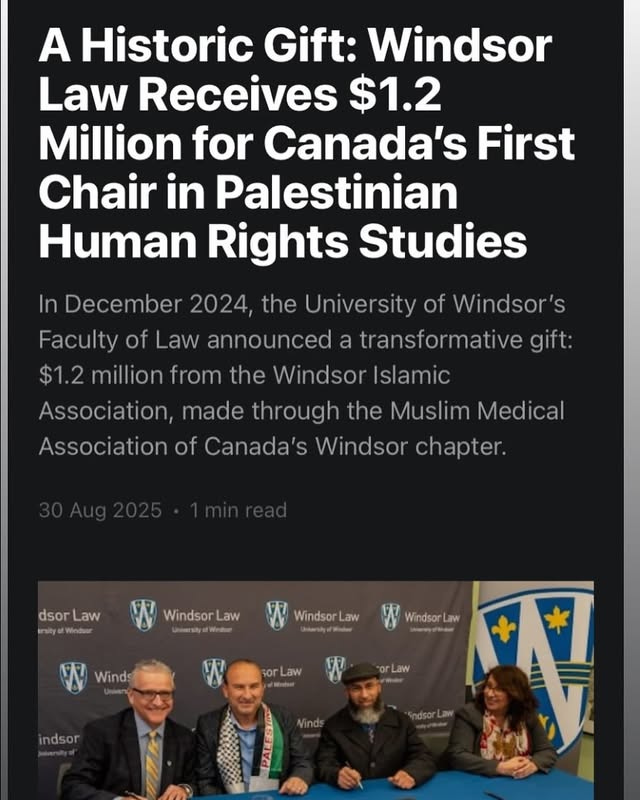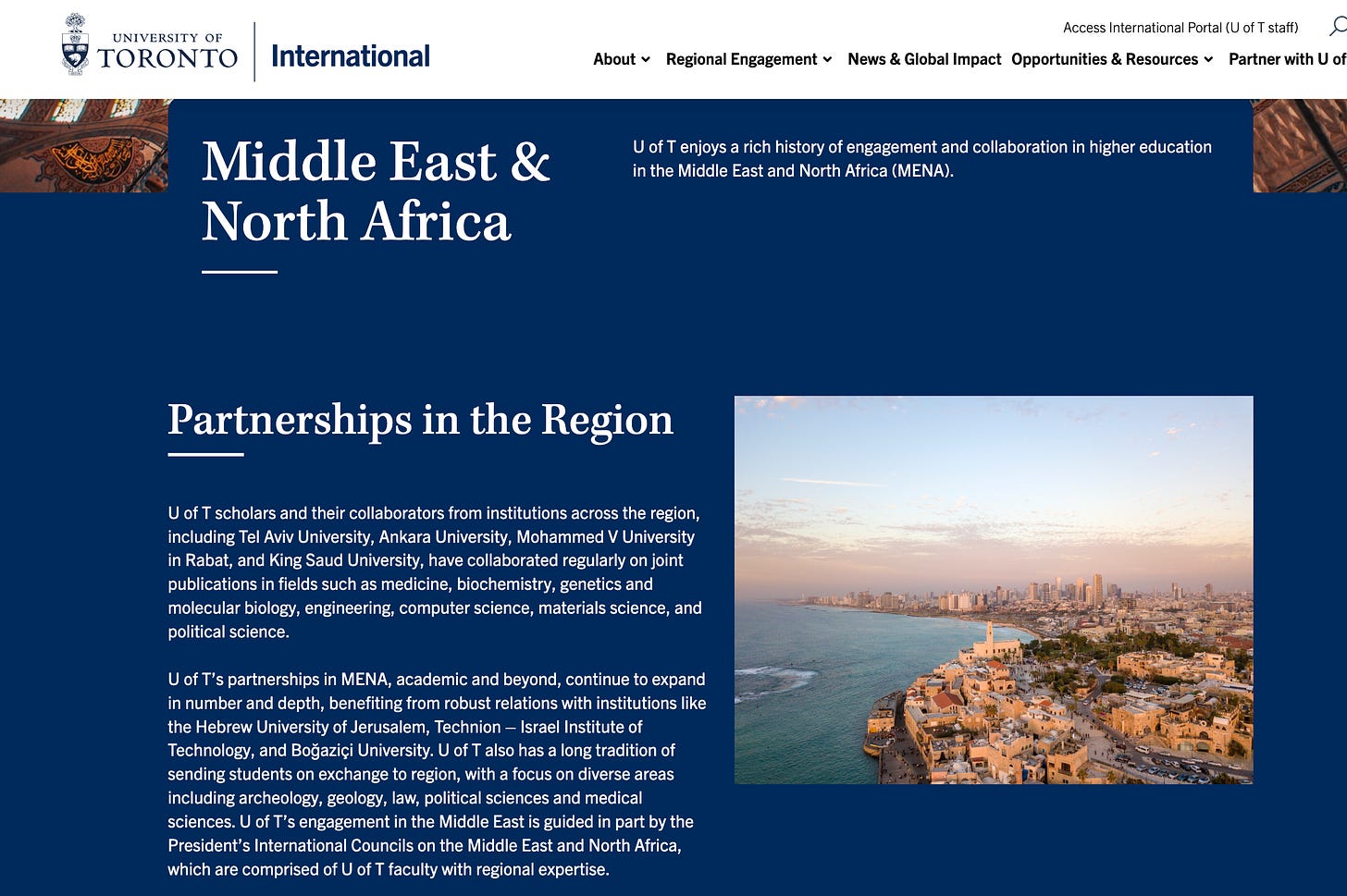How deep do UofT's partnerships with Israeli institutions run?
Quick answer: Very, very deep.
The Ties that Bind archive offers a timeline of publicly available evidence pertaining to the University of Toronto’s partnerships with Israeli institutions. At 40-page long, it is a rich, and growing, archive of academic complicity.
Back in 2024, the UofT branch of our collective offered a brief overview of the content of the archive. In May 2025, an update focusing on new institutional ties dating from after October 2023 was also published.
As a way to kick off this Substack, we are sharing what we know about the depth, and timeline, of UofT’s entanglements with Israeli institutions.
As it turns out, these grew exponentially under Meric Gertler’s presidency (2013-2025).
Since 2003, the UofT has been in partnerships with a total of eight Israeli academic institutions:
•Hebrew University of Jerusalem (est. 2003)
•Technion - Israel Institute of Technology (est. 2013)
•Tel Aviv Uiversity (est. 2015)
•University of Haifa (est. 2015)
•Weizmann Institute of Science (est. 2016)
•Jerusalem College of Technology (est. 2018)
•Ben Gurion University in the Neguev (est. 2018)
•Israel Institute (est. 2021)
Between October 2023 and August 2025, Ties that Bind lists publicly available evidence pertaining to partnerships with three universities: Technion - Israel Institute of Technology, Tel Aviv University, and the Hebrew University of Jerusalem.
In September 2025, an email regarding the expansion of the Canadian reciprocity work permit pathway for new hires from the Germany, the UK and Israel was sent to “Dean’s Office and Academic HR colleagues”, then to chairs, some of whom circulated it to their faculty list. Here is an excerpt from this email:
“Hello Dean’s Office and Academic HR colleagues,
In anticipation of upcoming recruitment and immigration requirements, I am reaching out to gather information about U of T students, faculty members, or researchers who have engaged in short or long-term academic activities in Germany since July 2024.
As you may recall, we utilize a Canadian reciprocity work permit pathway that relies on academic exchanges between institutions in Germany and the University of Toronto. Many departments within our university have successfully utilized this program for their new hires. To strengthen our case, we need to demonstrate that U of T community members have directly benefited from this program by participating in academic activities in these countries. When we apply for a reciprocity work permit, we submit details about the agreement and provide a list of U of T students, faculty members, or researchers who have travelled to Germany.
This year, we are going to expand to include the UK and Israel. U of T has many exchange agreements with universities and other large agencies in these countries. My hope is to gather enough proof of U of T academics and students and staff are going to the UK and Israel to justify the issuing of Canadian work permits to citizens of those countries. Below are details of the schools/institutions we have agreements with and the nature of the agreement.”
Five Israeli institutions are subsequently listed:
“Hebrew University of Jerusalem: Collaborative research projects and faculty exchanges in various disciplines, including humanities and social sciences
Tel Aviv University: Joint research initiatives and faculty mobility programs focusing on science and technology
Technion - Israel Institute of Technology: Exchange programs for faculty and students, promoting cross-border education and research in engineering and technology
Weizmann Institute of Science: Collaborative research and faculty exchanges in medical and health sciences
Ben-Gurion University of the Negev: Faculty exchanges and joint research projects in environmental studies and public policy”
In other words, despite the abundantly documented war crimes committed by Israel in Palestine; despite the fact that dozens of humanitarian and legal organizations, the International Association of genocide scholars and the UN all agree that Israel has committed genocide in Gaza; despite Francesca Albanese’s latest report, which specifically addresses the civil and criminal liability of the universities who refuse to cut ties and divest from Israeli apartheid; despite all of this, the University of Toronto continues to deepen its entanglements with Israeli institutions.
Meanwhile, the university has to date not released a single statement on the war crimes, including the epistemicide and genocide, perpetrated by Israel in Palestine. Neither has it funded a program for Palestinian students and scholars at risk similar to the one very quickly put together after Russia’s invasion of Ukraine. Moreover, apart from inviting departments within Arts and Science to bid for a single, Palestine-related tenure track position (the bid was “won” by Near and Middle Eastern Studies, who recently advertised a tenure stream position in “Palestinian Literature and Culture”), the administration has not to date taken any measure to found, and fund, Palestine Studies and attract (and retain) Palestinian colleagues working in this field1.
This comes in sharp contrast with the nearby University of Windsor, which announced over the summer that its Law faculty received $1.2 Million for Canada’s First Chair in Palestinian Human Rights Studies. The donation was made by the Muslim Medical Association of Canada’s Windsor chapter.
How widespread are UofT’s partnerships with Israeli institutions?
If one excludes the Humanities, the reach of Israeli partnerships within the UofT is staggering. To date, these are documented in the following units/labs/departments:
•Munk School
•Urban Studies and Urban Planning
•Medicine
•Engineering
•Life Sciences
•Social Work
•Nursing
•Health Policy, Management & Evaluation
•Archaeology
•Pharmacy
•UTM Forensic Science
•Entrepreneurship and Innovation
•Robotics
•Physics, Helen Diller Quantum Center
•Jewish Studies (through the Antisemitism Lab)
•Donnelly Centre for Cellular and Biomolecular Research
•AI Research and Education in Medicine
•Uoft Learning Abroad
•Rotman School of Management
•Law
•A general call was also made in 2025 for the following fields: Medicine, Engineering, Science, Social Science, Humanities, Law, Social Work
How many partnerships with Palestinian universities is the University of Toronto involved in?
None
How developed are UofT’s institutional partnerships with universities located in West Asia and the northern part of the African continent?
UofT International’s “MENA: Partnerships in the Region” page specifically names three universities, two of which are located in Israel: The Hebrew University of Jerusalem, Technion, and Boğaziçi University in Istanbul. In other words, not only has UofT not developed a single partnership with a Palestinian institution these past 20 years, but it has also failed, as per available information, to do so with any of the world’s 22 Arabic-speaking countries. Why is that? One wonders.
This is our first of many stories to come. Make sure to subscribe for updates and to follow us on our socials (Instagram and Bluesky).
UofT Arts and Science is the home of Hearing Palestine, “an intellectual hub at the University of Toronto that centers the study of Palestine and facilitates advanced interdisciplinary research on Palestine, past, present, and future”. Hearing Palestine is not, however, an official institute, lab, or centre, and it does not have any appointed faculty.



